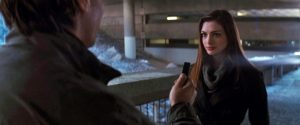By: Jessica Gonzalez
In 2012, The Dark Knight Rises was released, producing mass Batman hysteria across the country. The infamous Catwoman, also known as Selina Kyle, had her eye on a particular piece of software the characters referred to as “clean slate.” The program could erase Kyle’s criminal history from every computer database in the world permitting her a life of normalcy. The knight in shining armor comes to Kyle’s rescue giving her the program right before he sets off to save Gotham from a nuclear bomb. Usually the story would end here, but much to Warner Brother’s surprise software called “Clean Slate” already existed. Shockingly enough, this program cannot delete your entire criminal history but it can delete your computers history. Fortres Grand has been selling this software since 2000 and was not happy about Warner Bro’s allegedly infringing on their trademark.
Fortres Grand sued Warner Bro’s asserting reverse confusion, meaning that due to Hollywood’s extensive reach to consumers, consumers would be confused about both products and potentially mistaken Fortres Grand’s software for the software Selina Kyle was after. As proof, Fortres Grand stated that since the release of the Dark Knight Rises his profits have declined. After the case was dismissed in May, Fortres Grand appealed to the Seventh Circuit asking for the seven factors test to be applied to prove whether a consumer could be likely to be confused by two similar marks. The question then resonates—could consumers actually believe that Fortres Grand’s software could illegally erase their life history? Seventh Circuit Judge Daniel Manion stated it was “implausible.” He went on to say “[A]nyone who arrives at Fortres Grand’s website is very unlikely to imagine it is sponsored by Warner Bros. (assuming, safely, that Fortres Grand is not using Catwoman as a spokesperson for its program’s efficacy).”
Fortres Grand attempted to compare both products (the real and the fictional product) to prove consumer confusion, however they failed because Warner Bros. was introducing a movie production to the market, not a piece of software. Warner Bros. doesn’t sell merchandise similar to Fortres Grand’s software nor dabbles in that market. Therefore Fortres Grand did not have a valid trademark claim. Furthermore the phrase “clean slate” is descriptive and so broad that it’s unlikely to cause confusion. The Seventh Circuit asserted that people could tell the difference between a real product and a fictional product with the same name.
Bio: Jessica is a staff member of the Journal of High Technology Law. She is currently a 2L at Suffolk University Law concentrating in Intellectual Property.


You must be logged in to post a comment.